
Event tech moves at a rapid pace, I have seen tech and trends come and go, here are some of my thoughts on the future of event tech?
Technology will always play a role, but it is an enabler, rather than an end goal, which is where a lot of brand experiences and events trip up. As event professionals, we need to think holistically about the value tech can add not only to an event and the delegate experience but the wider business. Today's world is looking for connectivity more than ever. Technology isn't there to showcase itself, it's there to enhance customer experiences and should be approached with a human-first mindset.
For example, motion, voice, image and emotion recognition technology are exciting technologies to watch because they are an extension of our natural behaviour. It is early days, but more brands will start to experiment with this tech to understand its future role; how it enhances brand experiences and how can we leverage what people are already doing to create better experiences. These interfaces can be combined to create more relevant experiences for individuals and can be harnessed to make things easier, faster, more efficient and ultimately more compelling.
Events and experiential campaigns will seamlessly blend physical and digital
Virtual reality (VR) is currently at the peak of inflated expectations and a trough of disappointment. If used correctly, VR can be a powerful learning and experience tool. We recently used VR very successfully to create ocean experiences at the Transnet People’s Port Festival, but it can be applied to a myriad of industries, experiences and events. When used correctly, VR seamlessly blends the physical and the digital and will be the future of campaigns and events.
That said, the thing that will continue to define brilliant events remains great strategy, creative ideas and execution. Creativity is at the forefront - and while new channels or technologies enable new ways to disseminate those ideas, they should never get in the way of the ideas themselves.
Data gathering tech
Events are held to achieve various business objectives. But they should also be an opportunity to gather data.
For example, want to receive statistics on the number of people moving around, how long they spend within a space and how frequently they return. Meshh Analytics does that, and it also allows you to learn how visitors are behaving and interacting and, as the technology has a focus on footfall, as an event professional you can understand the conversion ratios and engagement data for the experience.
‘Actionable data’ is possible via Cvent’s data capture system. Event data can be instantly integrated with CRM and marketing automation systems for sales and marketing teams to use in communications. The data-based technology allows event organisers to capture rich data about attendees at every stage of an event's lifecycle; the data is then stored to build a complete profile of an attendee. The technology includes:
* online registration which features questions for guests and aims to gather information on what they want from the event and what they're interested in
- * onsite check-in and session scanning, which tracks guests' movements and notes which content they saw
- * mobile apps, which can gather attendees' interests and actions
- * lead capture, aimed at exhibitors to record details of conversations, giving you a chance to find out who was the most engaged at an event.
If it doesn’t exist, create it, a UK event company created Tillemetry to measure anything from consumer sentiment to campaign recall, as well as calculating repeat purchase likelihood and promotional effectiveness. Where technology can go, is only limited by your imagination and what you want to achieve.
So, at your next event consider your technology: does it enhance the event, it is customer-centric, and does it better the business beyond the event?
















Leave a Reply